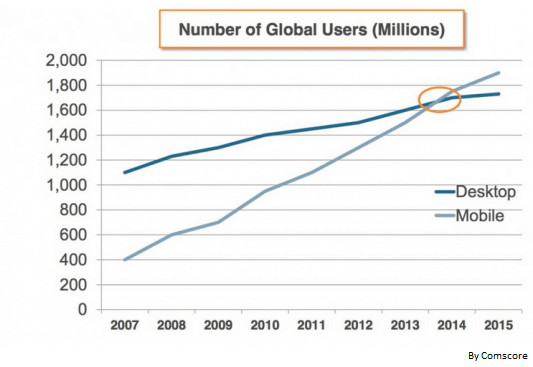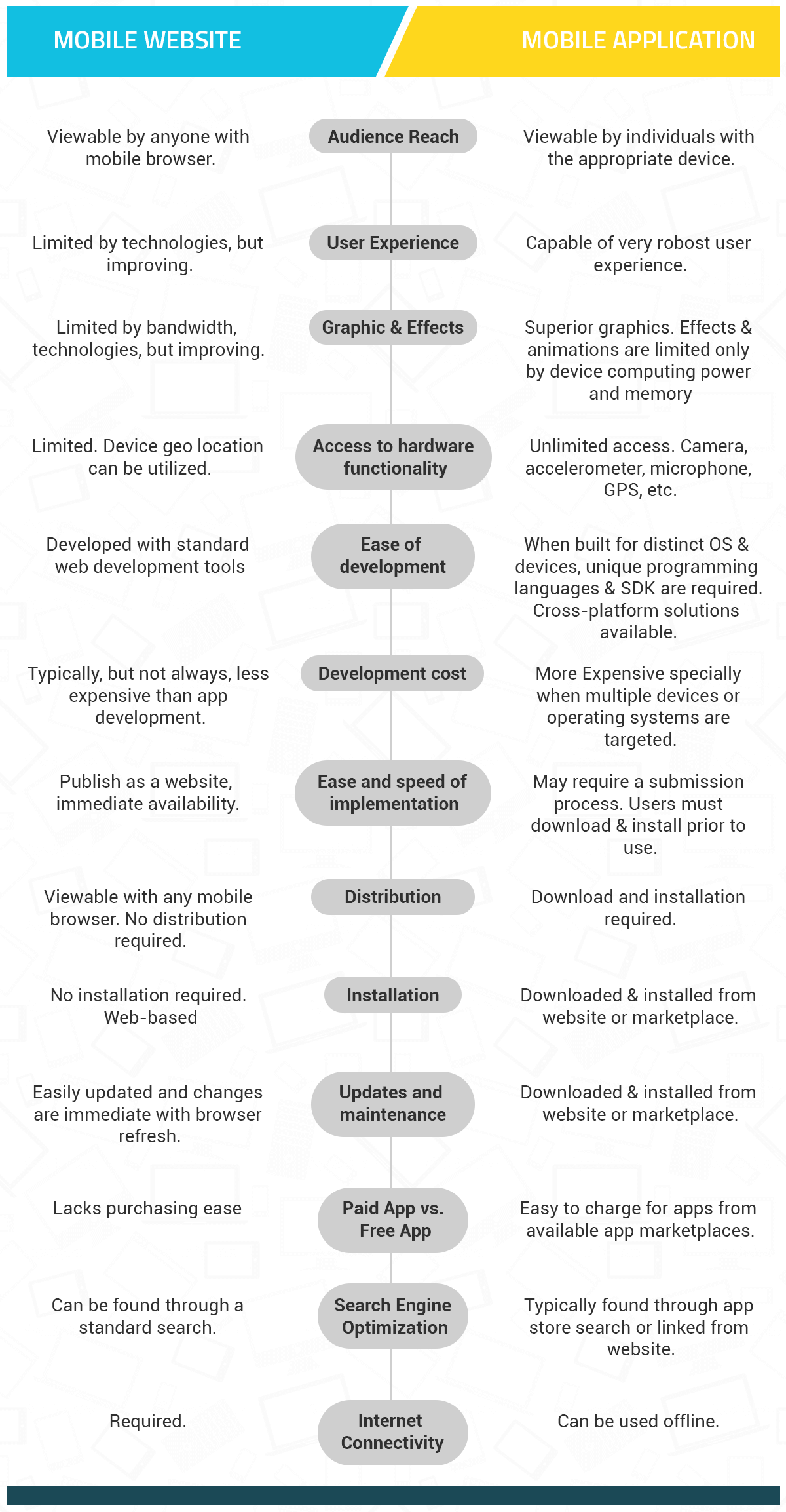
Preference Between Mobile Website and Mobile Application
Mobile traffic is globally surpassing the desktop-based traffic to the web in the world. It’s no longer a case of asking whether mobile marketing is important, we know it is!
So when it comes to planning for a broad marketing outreach via mobile presence for your business or organization one of the considerations that will strike your mind is whether you want to develop a mobile website or create a mobile IT for users to download or perhaps you want to go for both.
Mobile websites and mobile applications can look quite similar at first glimpse. Though deciding which would be more suitable for your business or organization is an important part of the decision and the conclusion which would be suitable depends upon a number of factors, including target audiences, available budget, required features, and intended purpose.
Mobile website and mobile application both are accessed on handheld devices like iPhones, tablets, iPads, Android phones, etc.
So before evaluating which one would be better let’s get deeper into the understanding of the difference between a Mobile Website and a Mobile Application.
Mobile Website
A mobile website is similar to any website which is a browser-based HTML page that are linked together to be accessed over the internet. Like any website, mobile websites can display text content, data, images, and video. A mobile website generally accesses mobile-specific features such as click-to-call (to dial a phone number) or location-based mapping.
Mobile Application
Mobile apps are actual applications that are downloaded and installed by users on their mobile devices. A user needs to visit operating system-specific portals or stores such as Apple’s app store, Google Play Store etc. in order to download the application. The App may fetch the content form the internet as a website does, or it may even download the content so it can be available for accessing even when the internet connection is not available.
The Difference Chart between Mobile Website and Mobile Application is as follows:
Advantages of a Mobile Website over Mobile Application
If the goals of your organization or business are primarily related to public communication or marketing to acquire clients then a mobile website is possibly the best practical step that would make sense for your mobile outreach strategy. This decision can be explained with a straightforward reason a mobile website has a number of advantages like its being broadly accessible and compatible on all devices and is even cost-effective.
- Instant Availability —
A mobile website is instantly available for access to the users across all ranges of devices via browsers.
On the other hand, apps are required to be downloaded and installed from the app marketplace before the content or application can be engaged which can be a significant barrier between initial action or conversion. - Compatibility —
A mobile website has a reach across users carrying different types of mobile devices, whereas apps require a separate version to be developed for each type of device. Mobile website URLs are easily integrated within other mobile technologies such as SMS, QR Codes, and NFC (near field communication). - Upgradability —
A mobile website is actually more dynamic than an app in terms of pure flexibility to update content. If you want to change the design or content of an app u need to push updates to your users to download it in order to update their app whereas in the case of a mobile website you simply need to publish the updated version and the changes are immediately visible over the browser. - Findability —
Mobile websites being mobile accessible versions of desktop websites have the same features as normal websites and so mobile websites pages can easily be found in search results. Most importantly, visitors to the regular website can be automatically sent to your mobile site when they are on a handheld (using device detection). In contrast, the visibility of apps is largely restricted to manufacturer app stores. - Shareability —
Mobile websites URLs are easily rotated to users via links on message, e-mail, social media, blog, or even in print. An app can’t be made to reach to users in a similar and such an easier fashion. - Reach —
A mobile website accessibility across all platforms makes it easier to be shared among users as well as search engines. - Time and Cost —
Development of a mobile website is considerably more time and cost-effective than the development of a mobile app, especially if you need to have a presence on different platforms whereas in the case of apps it requires the development of multiple apps. - Support and Sustainability —
The investment strategy in the case of application and mobile website vary a lot because an app needs a lot of investment consideration as compared to the mobile website. The application needs an initial launch along with proper support, development proper upgrades, testing, compatibility etc.
When Does an App Make Sense for reaching mobile users across mobile?
Despite the many natural benefits of the mobile website, Mobile apps are still very popular, and there are a number of specific use scenarios where an app will be your best choice. Here are a few things if you need one of the following, an application for your business or organization does make sense:
- Interactivity/Gaming —
If it’s an interactive game an app is almost always going to be users’ best choice. - Regular Usage/Personalization —
If you are planning to target users so that they may download and use your application in a personalized way on a regular basis then a mobile application would serve to solve your purpose better than a mobile website.
If the users you are targeting are going to use your application in a personalized way on regular basis then a mobile app is possibly the best way to approach it. - Complex Calculations/Reporting —
If your need is complex calculation or manipulation of data related to finance or investment etc. then an app will let you accomplish your task effectively. - Native Functionality/Processing required —
Mobile web browsers are getting increasingly good at accessing certain mobile-specific functions such as click-to-call, SMS, and GPS. However, if you need to access a user’s camera or processing power an app will still do that much more effectively. - Offline Usage Required —
If you feel that the content needs to be accessed offline or may even perform various functionalities without the internet then a mobile app would serve your needs. A survey by ComScore Stating Overwhelming Response for Mobile Application vs Mobile Website
In Conclusion
The “App vs Web” will remain a question of contemplation for organizations seeking to establish their mobile presence. If your organization’s goal is to deliver content that can be shared between users and can be easily found on search engines to have a broad mobile presence and is primarily marketing-driven then a mobile website is the most reasonable choice. On the other hand, if your goal is to create active engagement with users and to provide an application that works like a computer program and not just a mobile compatible website then a Mobile Application will be required to fulfill your requirements.
Your search for a web development company ends today. Contact our experts now!





![Turbocharge Your Mobile App with AI: 7 Integration Strategies [Infographic]](https://tamediacdn.techaheadcorp.com/wp-content/uploads/2024/03/16034248/Screenshot-2024-03-28-at-2.30.22%E2%80%AFPM.png)